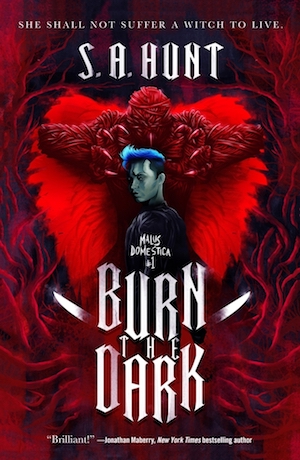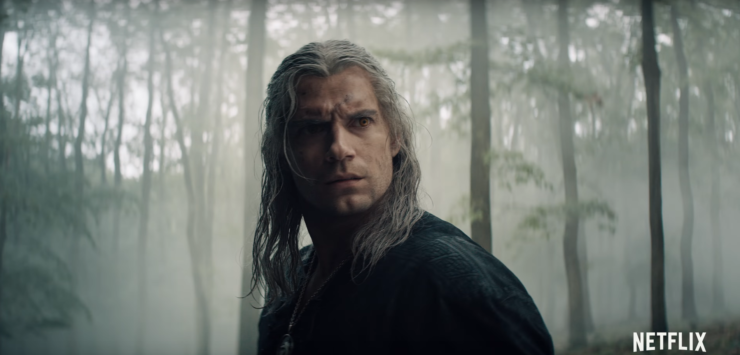I am now four episodes into Netflix’s The Witcher, and I just have to stop and say… What. Is. Happening?
I’m a huge fantasy fan, but I’m not a gamer, so my knowledge of The Witcher has always been always relegated to bits and pieces I’ve absorbed from friends and the internet over the years. (That is to say, all I really knew was that Geralt is a salty old monster hunter who nobody really likes, except there are also a lot of talented and hot ladies who are inexplicably really into him.) But then, after the Netflix series was announced, I found out that it was going to be pulling mostly from a book called The Last Wish.
“There are books?” I thought. “Wonderful! Now I can get my Witcher on.”
The thing is, though, that The Last Wish isn’t good. It has some enjoyable and interesting moments, but it drags impossibly in others. The book is also rampantly, painfully sexist—I went in expecting a fair amount and was still floored by it. Rape is so commonplace and treated so cavalierly it becomes the festive tapestry on The Last Wish’s dull, slightly moist castle wall, and if it weren’t for the occasional modern turn-of-phrase or curse word, I might have thought the books were written in the 1950s, when in fact The Last Wish was originally published in Poland in 1993. (The English version came out in 2007.)
The Witcher show is similarly behind its time. If it had come out in the early 90s, I probably would have been very impressed. The worst of the books’ sexist tropes have been updated, but not enough to meet the standards of 2019. The fun details about The Last Wish’s worldbuilding–like the balance between Chaos and magic, or how humans are settlers in this world, invaders who have taken over and driven elves and monsters from their homes–are still present, but the show doesn’t really do anything with them. And the timeline is almost impossible to track.
Buy the Book


Burn the Dark
The Witcher follows the events of The Last Wish pretty closely, with large swaths of dialogue lifted directly from the text, but it changes the order for some bizarre and inexplicable reason, and even having read the book didn’t make The Witcher’s timeline any easier to follow. Other reviewers have already tackled this problem, and even tried to sort through the mire and explain it all, so I won’t bother with that. What I will point out is that The Witcher needed to make its source material clearer, not obfuscate it.
In the book, all these seemingly disparate adventures (King Foltest’s incest-daughter-turned-striga, Jaskier and Geralt’s encounter with the sylvan and the elves at The Edge of the World, the whole thing with Renfri) are set within a framing story in which Geralt is recovering from injuries and chatting about his various adventures to one of his lovers. In The Witcher, this framing device has been removed and replaced by the story of Ciri, “the girl in the woods,” which means there’s no one to explain why we’re jumping about so randomly, or what timeline we’re in. Ciri is not in The Last Wish, although it does detail Geralt’s encounter with her family, with whom he invokes the Law of Surprise that will bind Ciri—not yet born—to him. Ciri and Geralt’s adventures are then the subject of the five books of the main Witcher Saga. Yennefer also has a standalone story in The Last Wish, but most of her background and adventures in the show are similarly drawn from the Saga.
I want to like Yennefer, and Ciri, and Geralt for that matter, but although a lot has happened to all of them in the space of four episodes, The Witcher doesn’t seem to know how to pull us into its characters. Granted, it does hit the nail on the head a few times. Jaskier the bard—whose name is Dandelion in the books—is a delight, not only because he because he brings some much-needed brevity to The Witcher, but because he gives Geralt something to play off of. Henry Cavill and Joey Batey have good on-screen chemistry; their duo hits that perfect sweet spot of the odd-couple friendship, the fool and the straight man, that is pretty much what I come to all stories for. Watching Geralt play off of someone else, not just be stoically sad or grimly dismissive at them but actually interact with them, actually lets us see something of who this man is.
The other time we get this is in the very first episode. Marilka, the macabre, sarcastic alderman’s daughter, is probably the best character in the show and drew me in immediately both as a person and as a key-in point for the kind of world Geralt inhabits. It’s worth noting that the show improved her character from basically nothing, giving her the role played by her father in The Last Wish. When she ordered Geralt to leave Blaviken and never return, I was more moved than I have been at anything else so far, even Ciri bidding farewell to her grandmother.
Another thing I love about this show is the fight work. Choreographer Vladimir Furdik does an excellent job of making Geralt’s fights look both rough and beautiful, and there’s lots of variety in the fight and stunt work that keeps things visually interesting. There was more of a complete and story in Geralt’s battle with Renfri than there was in any of the rest of their encounter (especially that sex/dream sequence which literally had me laughing aloud) and Cavil is amazing at the swordplay and hand-to-hand stuff, as long as he’s facing a real person and not a CGI monster. The costumes are also beautiful, which is not surprising since the costume designer is Tim Aslam.
But noting the beautiful costume work brings me back to my problem with The Witcher, because it gets me thinking about Aslam’s other work, such as Black Sails. On Black Sails, each character’s outfit told you instantly who they were, and costume changes often signaled a similar thematic or plot change within the story. But I’m not sure there was enough in the script of The Witcher for Aslam to pull that same trick, and it’s a pity. You see it in moments, like in the lion claws on Calanthe’s shoulders, or the gorgeous shape of Ciri’s plot-important blue cloak. Geralt’s outfit, honestly, I could take or leave. He looks best when he’s just running around in his shirtsleeves, anyway.
So I guess the thing that really baffles me about The Witcher is that it doesn’t seem to know what it wants to be.
But no, I take that back. I think The Witcher does know what it wants to be. It wants to be half easy fantasy romp that doesn’t require the audience to invest much brainpower in, and half gritty successor to HBO’s Game of Thrones. But The Witcher doesn’t have source material rich enough to be Game of Thrones, and the creators haven’t done the work to add that in. Without the complexity of the Game of Thrones world building, and with very little connection so far between any of the characters, the dark grittiness, or rather, grossness, of the Witcher is just that—gross. And without an infusion of real humor, it fails to be the enjoyable fantasy romp that it could have been.
In essence, The Witcher either needs to take itself more seriously, or much less. The show, like its source material, makes a half-hearted stab at tackling themes such as how difficult life for women is in its Medieval Times-esque world, and how humanity might be the true monsters after all. But it lacks the consistency to make those themes stick, or to tell us what it is trying to say about them, other than that they exist. It also has some fun moments from Geralt, whose world-weary sarcasm could be as enjoyable as that of the tired space dad Mandalorian or the hard-driving, oft-cussing, secretly-a-big-marshmallow Dean Winchester, if the show would just loosen up a little more and let the character be playful once in a while. Geralt and Jaskier are halfway there already, and while everyone wants this to be the next Game of Thrones, The Witcher would absolutely kill as a successor to shows like Hercules and Xena: Warrior Princess. There would still be room for the show’s more serious themes (for all its camp, Xena had a lot of intensely dark moments) and its sense of being unmoored from time and place wouldn’t matter so much.
Now, I’m aware that shows can take a while to find their feet, and that some of my complaints may be addressed further down the road. Perhaps when Ciri and Geralt finally meet, the show will let us know what its identity is really supposed to be, and why we should care about them. Perhaps the muddy question of humanity’s relationship to elves and monsters will become a clearer theme, with time. Perhaps we will spend less time throwing mud on naked ladies and pulling out their wombs (Honestly, what the hell was that? And we’re not even getting into the ethics and ableism around the portrayal of Yennefer, here.) and more time watching Dandelion rub chamomile on Geralt’s sore ass. But if the show was trying to hook me, it has failed. I’ll stay for the fights, and I’ll endure the gratuitous nudity the actresses are put through, but I hope that the show will allow itself to grow, to find a real identity. Otherwise, why not just play the video game? Or read the books?
But, like, you don’t really need to read the books though.
Sylas K Barrett is an actor, writer and regular contributor at Tor.com. You can read his other work here on the site, including his weekly column, Reading the Wheel of Time.










